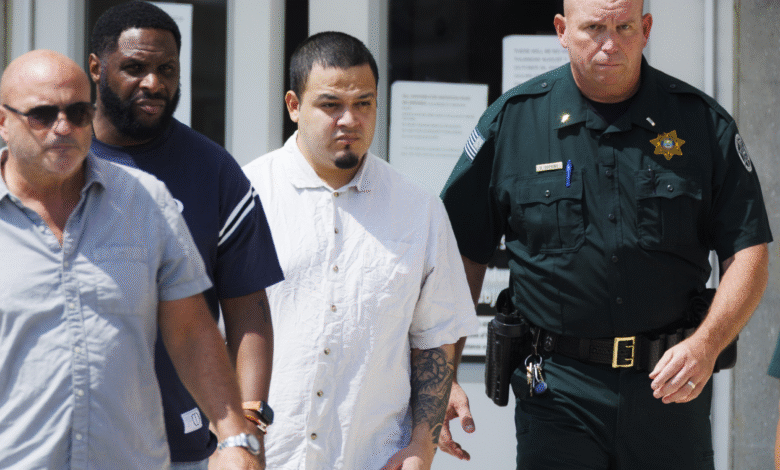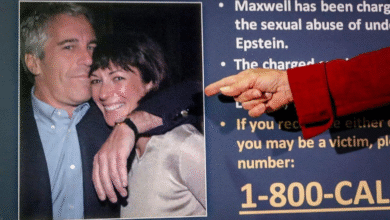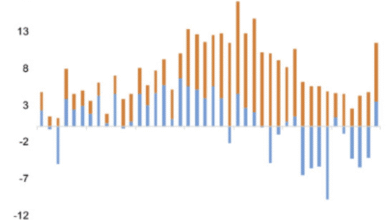Kilmar Abrego Garcia Deportation: An Ongoing Controversy

The recent decision to pursue the deportation of Kilmar Abrego Garcia exemplifies the stringent measures of the Trump immigration policy. His attorneys have raised concerns that Abrego Garcia is facing undue pressure to choose between accepting a plea deal or being forcefully sent to Uganda. This situation follows his controversial detention by ICE and subsequent deportation to a notorious prison in El Salvador, which the administration later labeled an “administrative error.” With the looming threat of deportation to Uganda or Costa Rica, Abrego Garcia’s case has captured national attention, highlighting the complexities of ICE deportation practices and human smuggling charges. As his legal journey unfolds, questions surrounding justice, safety, and selective prosecution remain at the forefront of the Kilmar Abrego case.
In an alarming twist of events, the Kilmar Abrego Garcia case has emerged as a poignant representation of the ongoing struggles faced by many under current immigration enforcement strategies. The threats of deportation to unsafe regions like Uganda or Costa Rica reflect broader concerns regarding the impact of aggressive immigration tactics and potential violations of human rights. Abrego Garcia’s legal battles, fuelled by accusations of human smuggling, reveal the intricate interplay between the justice system and immigration policies. As his situation develops, it underscores the pressing need for reforms to ensure fair treatment and safety for those facing deportation. Ultimately, the case serves as a critical lens through which to examine the consequences of stringent immigration enforcement.
Kilmar Abrego Garcia’s Deportation Saga
Kilmar Abrego Garcia’s situation exemplifies the complexities of immigration under the Trump administration’s stringent policies. His lawyers have voiced their concerns over a possible deportation to Uganda, which they argue is a ploy to pressure him into accepting a plea deal. The timeline of events has raised questions about the motivations behind the government’s actions, particularly the allegations of coercion surrounding his legal representation. With ICE’s plans to deport him hovering, the case has garnered significant attention, showcasing the stark realities faced by many individuals caught in the immigration system.
The Trump immigration policy has often faced criticism for its leniency towards aggressive deportations while being perceived as harsh on immigrants, especially those embroiled in legal issues. Kilmar Abrego Garcia’s case, marked by the suggestion of dual deportation options—one to Costa Rica and the other to Uganda—illustrates the kind of legal tumult migrants can experience. Furthermore, deporting Garcia to Uganda not only raises ethical questions but also brings to the forefront the discussion about human rights and safety for individuals sent back to countries where they may face persecution.
The Human Smuggling Charges Against Abrego Garcia
Kilmar Abrego Garcia is currently facing federal human smuggling charges, which add further complications to his deportation dilemma. Following his arrest and subsequent detention by ICE, these charges have positioned him at the crossroads of immigration enforcement and criminal law. The nature of these charges not only questions his integrity but also highlights the broader implications of human trafficking laws under the Trump administration. While invoking these laws, officials may appear to be combating illegal activities, yet the enforcement can also lead to human rights violations and lives being shattered in the process.
In the landscape of immigration reform, the relationship between human smuggling charges and the legal proceedings that follow is deeply intertwined. Abrego Garcia has consistently maintained his innocence, yet the pressure from the Trump administration to accept a guilty plea under the threat of deportation complicates his legal battle. This situation demonstrates how immigration enforcement and criminal charges can coalesce, potentially leading to injustices experienced by migrants who may not have the means or power to contest wrongful accusations.
Challenges Faced by Deportees Under Trump Immigration Policy
Deportation policies under the Trump administration have been characterized by uncertainty and fear, especially for those facing serious allegations like Kilmar Abrego Garcia. The pressure placed upon individuals to plead guilty in exchange for more favorable deportation outcomes is not an isolated incident; it reflects the broader challenges that many deportees encounter in the current immigration landscape. It raises ethical questions about the legitimacy of the legal system when individuals are forced to make decisions that could possibly result in their safety being compromised.
Moreover, the complexity of Garcia’s case underscores the dangerous implications surrounding deportations under dubious circumstances. The looming specter of being deported to Uganda has created significant anxiety for individuals like Garcia who question the safety of their return. As seen in various cases under Trump’s immigration policies, many deported individuals face not only uncertainty and fear but also the trauma of being sent back to environments where they may be at risk due to gang violence or political instability.
ICE’s Role in the Deportation of Kilmar Abrego Garcia
Immigration and Customs Enforcement (ICE) has played a pivotal role in the deportation saga of Kilmar Abrego Garcia. Following his release from detention, ICE’s immediate notification of intended deportation to Uganda has triggered allegations of coercive tactics used by the government. Released after lengthy detainment, Garcia now finds himself navigating a gauntlet of legal barriers designed by ICE, all while facing human smuggling charges that further complicate his situation. This reflects a concerning trend wherein ICE’s actions lack transparency, fueling distrust among the immigrant community.
ICE’s approach in Abrego Garcia’s case illustrates a larger narrative within the Trump administration’s immigration framework. By threatening deportation not just as a legal consequence but as a tool for coercion, ICE’s involvement signifies a shift toward harsher enforcement mechanisms that can undermine a fair judicial process. As ICE continues to make moves that may seem punitive rather than protective, the implications for those in similar positions as Garcia become more dire, raising important questions about justice, equity, and human rights in the immigration system.
Legal Representation and Vulnerability in Immigration Cases
Kilmar Abrego Garcia’s legal representation plays a crucial role in navigating the turbulent waters of his case. With accusations of coercion by the Trump administration driving the narrative, his attorneys are at the forefront of defending his rights and challenging the government’s actions. The stakes are particularly high in such immigration cases, where the legal defenses must be carefully structured not only to combat the charges but also to address the impending threat of deportation to a hostile environment. The legal team’s efforts highlight the importance of effective representation in ensuring due process for immigrants.
Furthermore, the vulnerability faced by legal representatives in immigration cases, particularly under the pressures of expediting proceedings, is significant. Abrego Garcia’s situation underscores how immigrant defendants can be coerced into unfavorable deals, hurting their chances at a just resolution. The need for adequately resourced and knowledgeable legal support in immigration matters has never been more pressing, as fears of deportation and uncertainty loom large. The struggle faced by Garcia paints a stark picture of the lengths to which some must go to protect their dignity in the face of aggressive immigration policies.
The Impact of Deportation on Family Structures
The implications of Kilmar Abrego Garcia’s potential deportation extend beyond just legal considerations; they also encompass profound social and emotional impacts on family structures. Dealing with the uncertainty of a loved one facing deportation creates immense psychological strain, which often leads to broken families and destabilized communities. The emotional toll that accompanies such situations can have lasting repercussions, affecting relationships, financial stability, and overall well-being. Family members of deportees often find themselves navigating their own challenges, compounded by the trauma of separation.
The family dynamics disrupted by deportations reflect a troubling trend under the immigration policies spearheaded by the Trump administration. As seen in Garcia’s case, the threat of being forced to leave the U.S. can disrupt familial ties that are pivotal to one’s identity and support system. The ramifications of these policies not only alter the lives of the individuals directly affected but also ripple throughout their families, leading to hardships that can span generations. Addressing these emotional and social impacts is essential for fostering healthier, more resilient communities.
Public Perception and Reactions to the Trump Administration’s Policies
The case of Kilmar Abrego Garcia and the ensuing discussions around his potential deportation have sparked public debate about the Trump administration’s immigration policies. Varied reactions from the public highlight the division in perspectives regarding immigration enforcement—some view these actions as necessary to prevent crime, while others criticize them as inhumane and counterproductive. The perceptions around Garcia’s situation reveal deep-seated anxieties regarding deportation strategies, particularly in light of the alleged coercion and the implications of human smuggling charges that frame his narrative.
Public discourse surrounding immigration policy has increasingly focused on human rights issues, drawing attention to cases like that of Kilmar Abrego Garcia. The controversies surrounding the enforcement tactics used by ICE underpin a broader critique of the administration’s aggressive deportation framework, which many see as unjust and selective. The contrasting views emerging in the public sphere indicate a growing need for an immigration reform that balances safety with compassion, prompting discussions on how future policies can be adapted to better serve human dignity and justice.
Future Implications for Immigration Policies
The ongoing saga of Kilmar Abrego Garcia raises significant questions about the future of immigration policies in the United States. As legal battles unfold and cases like Garcia’s gain visibility, there may be increasing calls for reform within the immigration system. The scrutiny placed upon the administration’s handling of deportation cases, especially those involving potential human rights violations, may push policymakers to reevaluate the tough-on-immigration stance espoused during the Trump presidency. The need for a balanced approach that safeguards human rights while ensuring public safety remains critical.
Looking ahead, the outcomes of high-profile cases will likely shape public opinion and influence legislative initiatives regarding immigration. The Kilmar Abrego Garcia case serves as a reminder of the complex relationship between immigration enforcement and legal justice, posing an urgent imperative for legal reforms that advance justice while addressing legitimate concerns. As society continues to contend with the ramifications of past policy decisions, it is crucial that future immigration policies prioritize humanity and safety in equal measure.
Frequently Asked Questions
What is the current status of Kilmar Abrego Garcia’s deportation case?
Kilmar Abrego Garcia is currently facing deportation to Uganda following his legal battles with U.S. immigration officials. His lawyers allege that the Trump administration is coercing him into pleading guilty to charges in exchange for a potential deportation to Costa Rica instead. Abrego Garcia was previously detained by ICE, leading to significant legal developments surrounding his case.
Why is Kilmar Abrego Garcia being deported to Uganda?
Kilmar Abrego Garcia is reportedly facing deportation to Uganda as part of the Trump administration’s strict immigration policy. His attorneys accuse the administration of pressuring him to plead guilty to federal human smuggling charges or risk being sent to Uganda, where they argue his safety would be compromised.
How does the Trump immigration policy affect Kilmar Abrego Garcia’s case?
The Trump immigration policy plays a crucial role in Kilmar Abrego Garcia’s case as it shapes the government’s approach to deportations and how individuals like him are treated. The administration’s focus on strict enforcement has led to his detention, proposed deportation to Uganda, and the offer of deportation to Costa Rica contingent on a guilty plea.
What are the human smuggling charges against Kilmar Abrego Garcia?
Kilmar Abrego Garcia faces federal human smuggling charges, which he contests in court. His legal team claims these charges are politically motivated and have been influenced by the Trump administration’s aggressive immigration stance.
What alternatives are there for Kilmar Abrego Garcia regarding his deportation?
Kilmar Abrego Garcia’s attorneys have stated that he was offered a plea deal by the Trump administration to avoid deportation to Uganda. This deal entails a potential deportation to Costa Rica after serving any imposed sentence, but only if he pleads guilty to the charges.
What are the implications of Kilmar Abrego Garcia’s case on immigration policy?
Kilmar Abrego Garcia’s case highlights the implications of the Trump administration’s immigration policy, showcasing the pressure on individuals facing deportation. His situation illustrates the broader concerns regarding human rights and the tactics used by ICE in the deportation process, particularly in cases involving allegations of gang affiliation.
What legal options does Kilmar Abrego Garcia have against deportation to Uganda?
Kilmar Abrego Garcia’s legal options include challenging the deportation order itself through the courts, arguing against the validity of the charges, and asserting that the deportation would jeopardize his safety based on prior allegations of persecution in Uganda.
How did Kilmar Abrego Garcia end up with ICE?
Kilmar Abrego Garcia was taken into custody by ICE in March, following the Trump administration’s intensified focus on immigration enforcement. His detention was criticized as part of a larger pattern of selective prosecution linked to his alleged gang affiliations.
Why is the Kilmar Abrego Garcia case important?
The Kilmar Abrego Garcia case is significant as it exemplifies the extreme measures taken under the Trump administration’s immigration policies, raising critical questions about human rights, legal fairness, and the treatment of individuals facing deportation based on contested charges.
What can be expected during Kilmar Abrego Garcia’s trial in January?
During Kilmar Abrego Garcia’s trial set for January, significant legal arguments regarding the human smuggling charges will be made, potentially influencing the outcome of his deportation case. His defense strategy may highlight alleged coercive tactics by the Trump administration.
| Key Points |
|---|
| Kilmar Abrego Garcia is facing deportation issues under the Trump administration’s policies. |
| His lawyers claim the administration is pressuring him into pleading guilty or facing deportation to Uganda. |
| Garcia was detained by ICE in March, previously deported to El Salvador but later returned to the U.S. |
| A proposed plea deal includes agreeing to be deported to Costa Rica after serving any imposed sentence. |
| Abrego Garcia was released from jail in Tennessee in August 2025, only to face impending deportation. |
| The situation is highlighted by accusations of coercion and selective prosecution by the government. |
| Pending charges relate to federal human smuggling activities, with a trial set for January. |
Summary
Kilmar Abrego Garcia’s deportation has sparked significant controversy as the Trump administration attempts to force his compliance through legal coercion. His lawyers assert that the administration is essentially manipulating legal outcomes to dictate Garcia’s deportation options, either back to Costa Rica under a plea deal or to Uganda, where his safety is highly questionable. This case not only showcases the strict immigration policies of the administration but also raises alarming concerns regarding due process and the treatment of individuals within the immigration system.




